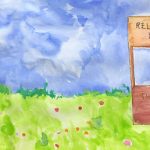Listening To Yourself
Full and frank disclosure is one of the fiduciary duties we owe each client. When a client is making a decision based on incomplete information, it’s usually not good. Not only do we need to make sure our clients have the important facts, it is our job to help them understand the meaning behind the facts. Without being fully informed, how can they make their best decision?
While telling a client information they don’t want to hear is hard, watching them make a bad decision because they can’t or won’t deal with the truth is even harder. It can be a fine line between insuring that a client fully understands all of the risks and not pushing my opinion of what they should do. I try not to cross the line, but I don’t know if I am always successful.
Unfortunately, the legal obligation to keep my clients fully informed does not apply myself. There is no Ethical Cannon or Directive that I am obligated to follow when it comes to dealing with the truths about who I am and how work relates to my core purposes.
I know I have chosen to ignore important facts or not have given them the consideration they are due. I have bent, twisted, and distorted the reality of situations because of fear and thought processes that have not adapted to changing times. The greater the role fear plays in any decision – be it at work, with my children or partner – my thought process is lessened. I fall back on old and out dated thought patterns. It is harder to pay attention to all of the facts I need to be considering.
Just like my clients, there is no guarantee I will make the best decisions for myself. I do increase the odds when I am willing to hold myself to the same standard that I owe my clients. Working at being aware of all the relevant facts and not allowing fear of the unknown to disproportionately influence my decisions are two of the best ways I have come up with to help me.
My fears seldom come to pass. The amount of time I spend unproductively worry is mind boggling. If I were to list all of my fears over the last year, only a very few would have happened. The trick for each of us is coming up with ways to better see when fear is clouding our decision making process and when we are using faulty thought processes. Both get in the way of providing ourselves with full and frank disclosure.
How do you make sure you are listening to yourself?









“Be here now.” So easy to say, so hard to actually accomplish — instead of seeing each situation actually before us, and thinking anew, we rely on the efficiency of having a lifetime of old thoughts stored, which we can immediately apply without effort — and that can be good, but it can also powerfully obscure what makes this situation not the same as the prior ones.
I think the quest for honesty and truth is a good one, and a laudable one. It’s not simple. As we get older, it’s easier, although we have to work through our layered-on biases and misconceptions. I applaud your efforts, and I’ll keep reading your web site.